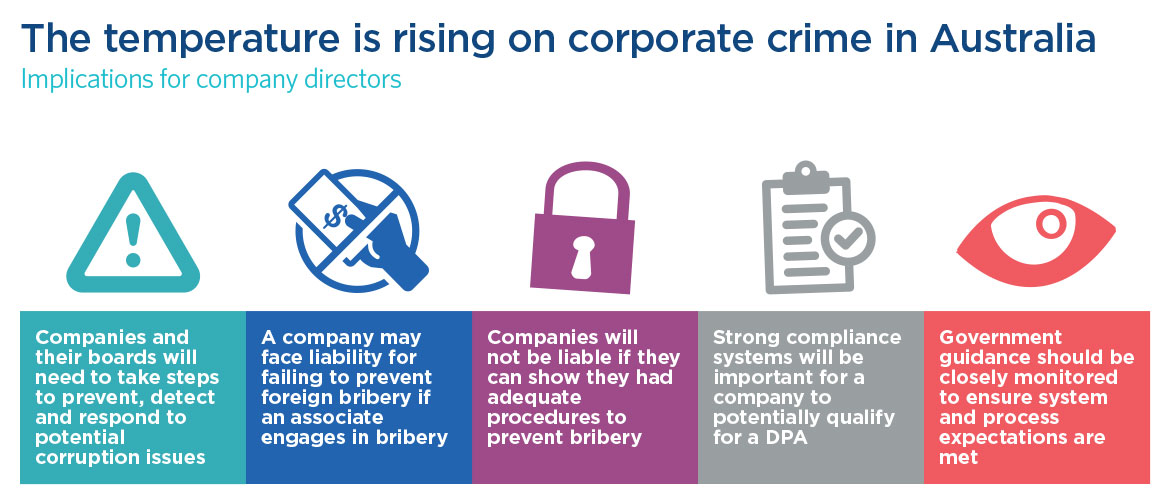Proposed corporate crime reforms will involve a sea change in director responsibility. Rather than directors reacting to issues that come to their attention like foreign bribery offences, it will be important for directors to take proactive steps to ensure such issues do not arise.
While the corporate sector waits for the Government to finalise legislation, this period presents an opportunity for directors to ensure their companies are ready for the impending changes.

What are the changes to foreign bribery legislation?
The proposed changes in the current Bill see the government commit to two significant reforms: expanding the reach of foreign bribery laws and introducing a deferred prosecution agreement (DPA) scheme.
As discussed in our article last year,1 DPAs are effectively a mechanism for companies and prosecutors to ‘settle’ matters involving criminal charges against companies, like foreign bribery offences. DPAs have been transformative overseas in the way authorities tackle corporate misconduct, particularly in the US and increasingly the UK.
The other key change would be introducing a new corporate offence of failing to prevent foreign bribery – similar to the offence in the UK’s Bribery Act.
The proposed reforms reflect the pressure on Australia internationally (particularly from the OECD) to step up its track record on enforcement of foreign bribery laws.
These changes also coincide with the Government’s moves to introduce new whistleblowing laws designed to encourage reporting of potential misconduct.
How do they impact Australian companies?
The scheme reflected in the Bill (and the proposed whistleblowing laws) aims to make it easier for authorities to detect corporate misconduct and encourage companies to come forward and report issues they detect internally.
These new mechanisms give Australian prosecutors more flexibility in how they can resolve allegations and seek to hold companies to account.
Combined with the new corporate offence of failing to prevent bribery, DPAs have the potential to shift the dial in Australia’s enforcement of foreign bribery laws.
The recently released draft Code of Practice for the DPA scheme provides insight into how the Attorney General’s department perceives the scheme will operate in practice. The draft Code clarifies the public interest factors that the Commonwealth Director of Public Prosecutions may consider in deciding whether to offer DPA negotiations, particularly the nature and extent of the requirement to co-operate. For further information please see our June Legal Briefing.2
Although much of the discussion around DPAs has focused on foreign bribery, it is significant that the scheme will also extend to other forms of corporate misconduct prohibited under federal laws including sanctions, money-laundering, market misconduct and domestic bribery offences.
What do they mean for company directors?
There is a higher onus on companies and their Boards to ensure they take steps to prevent, detect and respond to potential corruption issues.
The new offence of failing to prevent bribery effectively reverses the onus to establish corporate liability for foreign bribery. The existing corporate attribution principles will remain but a company will also potentially face liability if an ‘associate’ engages in bribery. It will then be necessary for the company to establish a defence - companies will not be liable if they can show they had adequate procedures to prevent bribery.
Strong compliance systems will also be important for a company to potentially qualify for a DPA.
The Bill envisages that the Government will issue guidance on the steps companies can take to prevent foreign bribery. Directors should be ensuring their companies closely monitor that guidance and engage with any consultation process the government runs on the proposed guidance, to ensure companies have clarity around expectations in this area, and that their systems and processes meet those expectations.
How can Company Directors ensure their company complies with the law?
Having robust internal systems and process to ensure compliance with the law is key.
Those systems should include regular reporting to directors on how the company embeds its anti-corruption policy and its efforts to prevent corruption, plus the company’s ongoing steps to monitor and detect any potential issues. This is consistent with the proposed new recommendations in the ASX Corporate Governance Council’s Principles and Recommendations for listed entities to have and disclose an anti-bribery policy and ensure the Board is informed of any material breaches of that policy.
The systems must be lived and breathed. A paper policy alone will not be sufficient to establish adequate bribery prevention procedures.
The proposed reform will involve a sea change in director responsibility. Rather than directors reacting to issues that come to their attention, it will be important for directors to take steps to ensure such issues do not arise.
Endnotes
- New Australian measures to combat Corporate Crime
- Draft Code of Practice provides insight into operation of Australia’s proposed DPA Scheme
This material first appeared in Company Director Magazine, July 2018.
Key contacts
Legal Notice
The contents of this publication are for reference purposes only and may not be current as at the date of accessing this publication. They do not constitute legal advice and should not be relied upon as such. Specific legal advice about your specific circumstances should always be sought separately before taking any action based on this publication.
© Herbert Smith Freehills 2024





